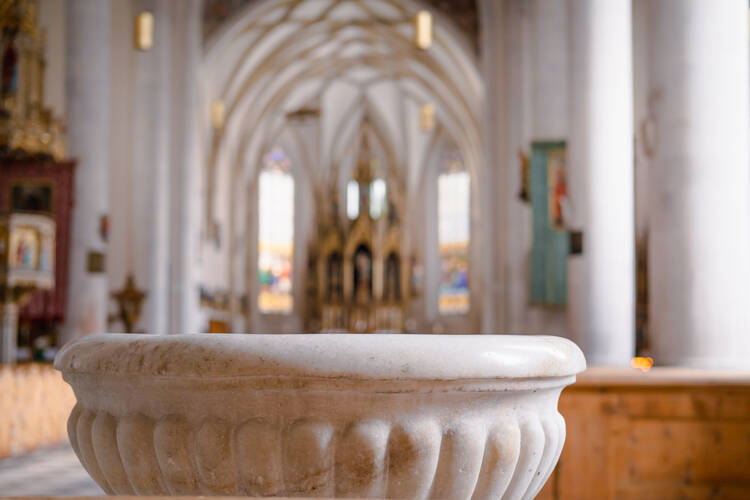A Reflection for Monday of the Fourteenth Week in Ordinary Time
Find today’s readings here
“Courage, daughter! Your faith has saved you.”
And from that hour the woman was cured. (Mt 9:18-26)
Other than being an O’Hare Fellow here at America, one of my lesser-known roles is as our office sacristan. This is a Catholic magazine, after all. You didn’t think we’d have a chapel in our Manhattan office?
As I was preparing the chapel on a Tuesday afternoon this past winter, I was met with a challenge. The dish of holy water in the chapel doorway was empty.
I grew up as an altar girl and spent many a Sunday holding the aspersorium (the thing that sprinkles the holy water over the congregation) alongside my parish priest. But as I stood in the office chapel preparing for Mass, I soon realized I had no idea where holy water actually came from. Did the Vatican have a special fountain of holy water? Did the diocese hand deliver it to our doorstep?
I asked our literary editor and America historian James T. Keane this question: How do I get holy water and get it fast? His response was simple—ask Sam to make you some. He was referring to our editor in chief, Sam Sawyer, S.J. So I walked into Sam’s office and sheepishly asked if he could make some holy water, to which he cheerfully replied, “Sure, go fill up a pitcher.” We bowed our heads, Sam extended his hands, and we prayed. The water was made holy—a small miracle on a Tuesday afternoon in our office, performed with joy and ease.
In today’s Gospel, Jesus performs two big miracles in what seems to be a pretty effortless manner. First, he is greeted by an official who asks Jesus to raise his daughter from the dead. He does not ask Jesus to make a great sacrifice or to pray for 40 days and nights. No, all Jesus must do is “come, lay your hand on her, and she will live.” Of course, this miracle works because of Jesus’ all-saving power; just his touch can bring about new life. But there is another kind of miracle occurring here: The official dared to ask, to believe that Jesus can perform miracles, that such healing powers exist.
The second miracle has always fascinated me. The woman who was “suffering hemorrhages for twelve years” believes that if she can simply touch Jesus’ cloak, she will be cured. A woman bleeding, not unlike when menstruating, would have been considered unclean by traditional Jewish law and could not touch a man. But, in such a small act, she touches only the tassel of his cloak, and Jesus, instead of seeing this as a defaming act, receives her gesture with love and healing. He affirms her bravery in believing in miracles: “Courage, daughter! Your faith has saved you.”
Sometimes, miracles feel far away from us, as if they only happened in the Bible or are repeated in stories or used as evidence of canonization. I think miracles can feel foreign because we equate miracles with some big event: curing a bleeding woman or raising someone from the dead. But what if we dared to believe in the power of small miracles, of the giftedness of the ordinary? What if the merciful God acting through Jesus’ healing touch in the Gospel today is the very same God blessing a plastic pitcher of water on a Tuesday in midtown Manhattan? That is the kind of miracle I can always believe in.
How has God transformed your ordinary into holy through small miracles?








